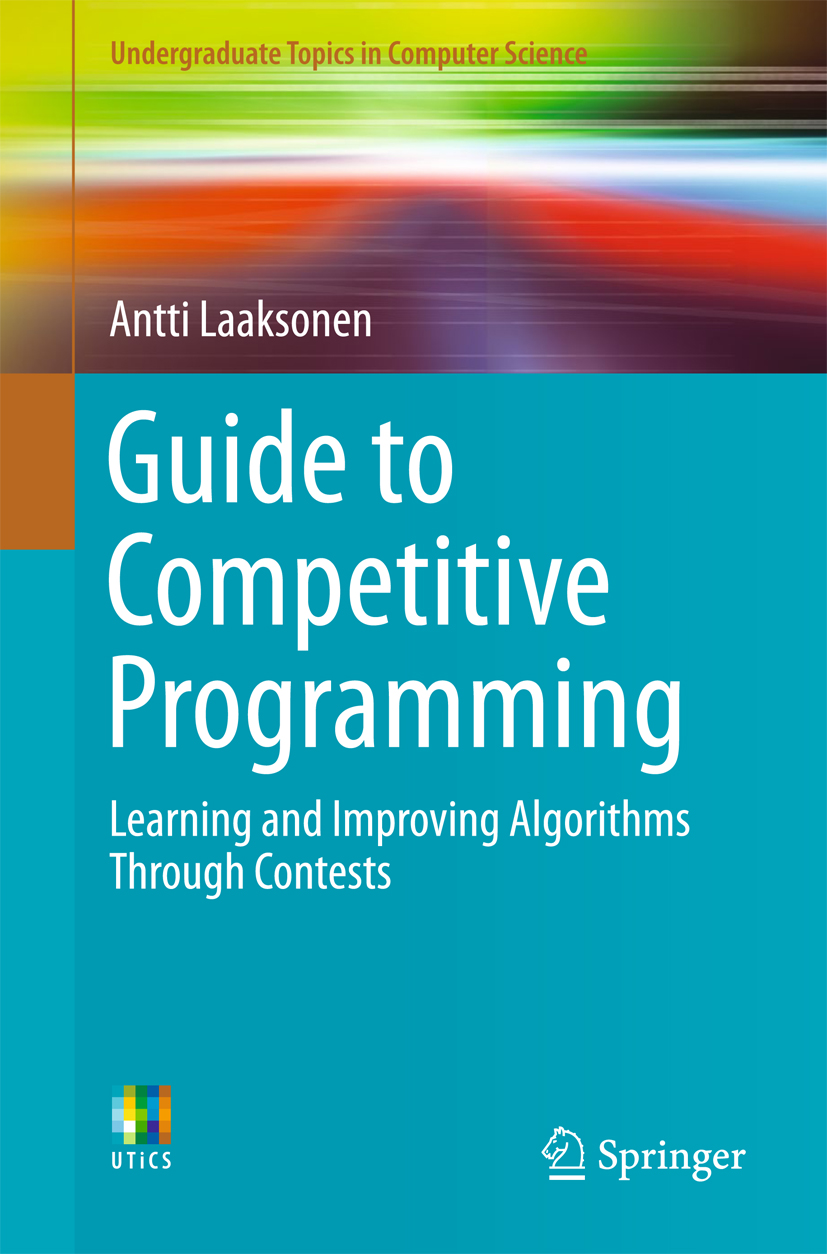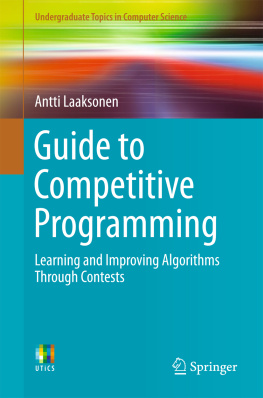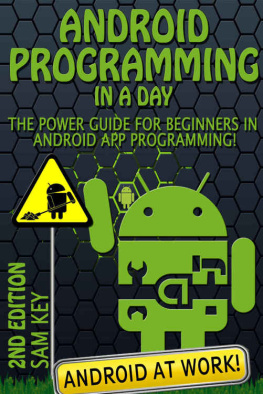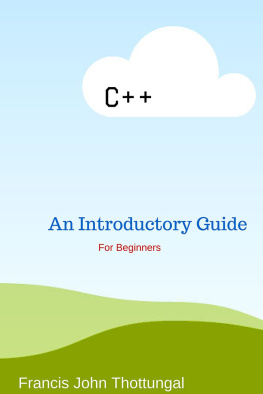Antti Laaksonen - Guide to Competitive Programming
Here you can read online Antti Laaksonen - Guide to Competitive Programming full text of the book (entire story) in english for free. Download pdf and epub, get meaning, cover and reviews about this ebook. year: 0, publisher: Springer International Publishing, genre: Children. Description of the work, (preface) as well as reviews are available. Best literature library LitArk.com created for fans of good reading and offers a wide selection of genres:
Romance novel
Science fiction
Adventure
Detective
Science
History
Home and family
Prose
Art
Politics
Computer
Non-fiction
Religion
Business
Children
Humor
Choose a favorite category and find really read worthwhile books. Enjoy immersion in the world of imagination, feel the emotions of the characters or learn something new for yourself, make an fascinating discovery.
- Book:Guide to Competitive Programming
- Author:
- Publisher:Springer International Publishing
- Genre:
- Year:0
- Rating:3 / 5
- Favourites:Add to favourites
- Your mark:
- 60
- 1
- 2
- 3
- 4
- 5
Guide to Competitive Programming: summary, description and annotation
We offer to read an annotation, description, summary or preface (depends on what the author of the book "Guide to Competitive Programming" wrote himself). If you haven't found the necessary information about the book — write in the comments, we will try to find it.
Guide to Competitive Programming — read online for free the complete book (whole text) full work
Below is the text of the book, divided by pages. System saving the place of the last page read, allows you to conveniently read the book "Guide to Competitive Programming" online for free, without having to search again every time where you left off. Put a bookmark, and you can go to the page where you finished reading at any time.
Font size:
Interval:
Bookmark:

Series editor
Ian Mackie
Advisory Board
Samson Abramsky, University of Oxford, Oxford, UK
Chris Hankin, Imperial College London, London, UK
Dexter C. Kozen, Cornell University, Ithaca, USA
Andrew Pitts, University of Cambridge, Cambridge, UK
Hanne Riis Nielson, Technical University of Denmark, Kongens Lyngby, Denmark
Steven S. Skiena, Stony Brook University, Stony Brook, USA
Iain Stewart, University of Durham, Durham, UK
Undergraduate Topics in Computer Science (UTiCS) delivers high-quality instructional content for undergraduates studying in all areas of computing and information science. From core foundational and theoretical material to final-year topics and applications, UTiCS books take a fresh, concise, and modern approach and are ideal for self-study or for a one- or two-semester course. The texts are all authored by established experts in their fields, reviewed by an international advisory board, and contain numerous examples and problems. Many include fully worked solutions.
More information about this series at http://www.springer.com/series/7592

This Springer imprint is published by the registered company is Springer International Publishing AG part of Springer Nature.
The registered company address is: Gewerbestrasse 11, 6330 Cham, Switzerland
The purpose of this book is to give you a comprehensive introduction to modern competitive programming. It is assumed that you already know the basics of programming, but previous background in algorithm design or programming contests is not necessary. Since the book covers a wide range of topics of various difficulty, it suits both for beginners and more experienced readers.
Programming contests already have a quite long history. The International Collegiate Programming Contest for university students was started during the 1970s, and the first International Olympiad in Informatics for secondary school students was organized in 1989. Both competitions are now established events with a large number of participants from all around the world.
Today, competitive programming is more popular than ever. The Internet has played a significant role in this progress. There is now an active online community of competitive programmers, and many contests are organized every week. At the same time, the difficulty of contests is increasing. Techniques that only the very best participants mastered some years ago are now standard tools known by a large number of people.
Competitive programming has its roots in the scientific study of algorithms. However, while a computer scientist writes a proof to show that their algorithm works, a competitive programmer implements their algorithm and submits it to a contest system. Then, the algorithm is tested using a set of test cases, and if it passes all of them, it is accepted. This is an essential element in competitive programming, because it provides a way to automatically get strong evidence that an algorithm works. In fact, competitive programming has proved to be an excellent way to learn algorithms, because it encourages to design algorithms that really work, instead of sketching ideas that may work or not.
Another benefit of competitive programming is that contest problems require thinking . In particular, there are no spoilers in problem statements. This is actually a severe problem in many algorithms courses. You are given a nice problem to solve, but then the last sentence says, for example: Hint : modify Dijkstras algorithm to solve the problem. After reading this, there is not much thinking needed, because you already know how to solve the problem. This never happens in competitive programming. Instead, you have a full set of tools available, and you have to figure out yourself which of them to use.
Solving competitive programming problems also improves ones programming and debugging skills. Typically, a solution is awarded points only if it correctly solves all test cases, so a successful competitive programmer has to be able to implement programs that do not have bugs. This is a valuable skill in software engineering, and it is not a coincidence that IT companies are interested in people who have background in competitive programming.
It takes a long time to become a good competitive programmer, but it is also an opportunity to learn a lot. You can be sure that you will get a good general understanding of algorithms if you spend time reading the book, solving problems, and taking part in contests.
If you have any feedback, I would like to hear it! You can always send me a message to ahslaaks@cs.helsinki.fi.
Font size:
Interval:
Bookmark:
Similar books «Guide to Competitive Programming»
Look at similar books to Guide to Competitive Programming. We have selected literature similar in name and meaning in the hope of providing readers with more options to find new, interesting, not yet read works.
Discussion, reviews of the book Guide to Competitive Programming and just readers' own opinions. Leave your comments, write what you think about the work, its meaning or the main characters. Specify what exactly you liked and what you didn't like, and why you think so.





![Antti Tuomainen [Antti Tuomainen] - Little Siberia](/uploads/posts/book/140015/thumbs/antti-tuomainen-antti-tuomainen-little-siberia.jpg)

